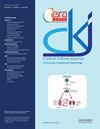羟氯喹作为 MPO-AAV 诱导疗法的附加疗法:一项回顾性队列研究
IF 3.9
2区 医学
Q1 UROLOGY & NEPHROLOGY
引用次数: 0
摘要
背景 骨髓过氧化物酶(MPO)-抗中性粒细胞胞浆抗体(ANCA)相关性脉管炎(AAV)患者接受标准诱导治疗后的缓解率远远不能令人满意。提高 MPO-AAV 患者的缓解率至关重要。羟氯喹(HCQ)是经典的抗疟疾药物之一,已被广泛用于各种自身免疫性风湿病。这项回顾性观察队列研究旨在评估在 MPO-AAV 诱导治疗期间使用 HCQ 的有效性和安全性。方法 收集 2021 年 1 月至 2023 年 9 月中南大学湘雅医院确诊为 MPO-AAV 患者的病历资料。根据是否使用 HCQ,将患者分为 HCQ 组和对照组。通过倾向得分匹配筛选出纳入的患者。为了评估 MPO-AAV 患者是否受益于 HCQ,我们比较了两组患者的预后。我们还记录了随访期间 HCQ 的不良反应。结果 HCQ 组和对照组的完全缓解、反应和治疗抵抗的构成比有统计学差异(P = 0.021)。两组一年肾脏存活率无明显差异(P = 0.789)。HCQ 组患者的一年存活率高于对照组(P = 0.049)。HCQ 组未出现严重不良反应。结论 HCQ 联合标准诱导治疗可提高 MPO-AAV 患者的缓解率,而且在我们的研究中,HCQ 具有良好的安全性。本文章由计算机程序翻译,如有差异,请以英文原文为准。
Hydroxychloroquine as an add-on therapy for the induction therapy of MPO-AAV: a retrospective observational cohort study
Background The remission rate of myeloperoxidase (MPO)-antineutrophil cytoplasmic antibody (ANCA)–associated vasculitis (AAV) patients who received standard induction therapy is far from satisfactory. Improving the remission rate of MPO-AAV patients is essential. Hydroxychloroquine (HCQ), one of the classic antimalarial drugs, has been widely used in various autoimmune rheumatic diseases. This retrospective observational cohort study is aimed to evaluate the efficacy and safety of HCQ during induction treatment for MPO-AAV. Methods The medical records of patients diagnosed with MPO-AAV at Xiangya Hospital, Central South University from January 2021 to September 2023 were collected. They were assigned to the HCQ group or control group according to whether they used HCQ. The patients included were screened by propensity score matching. To evaluate whether MPO-AAV patients benefited from HCQ, we compared the prognosis of the two groups. The adverse effects of HCQ during follow-up were recorded. Results The composition ratio of complete remission, response and treatment resistance between HCQ group and control group were different statistically (P = 0.021). There was no significant difference between the two groups in one-year renal survival (P = 0.789). The HCQ group had better one-year patient survival than the control group (P = 0.049). No serious adverse effects were documented in the HCQ group. Conclusions HCQ together with standard induction treatment may improve the remission rate of MPO-AAV patients, and HCQ has good safety in our study.
求助全文
通过发布文献求助,成功后即可免费获取论文全文。
去求助
来源期刊

Clinical Kidney Journal
Medicine-Transplantation
CiteScore
6.70
自引率
10.90%
发文量
242
审稿时长
8 weeks
期刊介绍:
About the Journal
Clinical Kidney Journal: Clinical and Translational Nephrology (ckj), an official journal of the ERA-EDTA (European Renal Association-European Dialysis and Transplant Association), is a fully open access, online only journal publishing bimonthly. The journal is an essential educational and training resource integrating clinical, translational and educational research into clinical practice. ckj aims to contribute to a translational research culture among nephrologists and kidney pathologists that helps close the gap between basic researchers and practicing clinicians and promote sorely needed innovation in the Nephrology field. All research articles in this journal have undergone peer review.
 求助内容:
求助内容: 应助结果提醒方式:
应助结果提醒方式:


